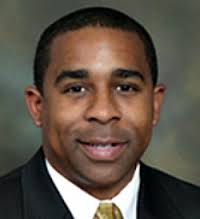By W. Carlton Weddington, on Sun Aug 3, 2014 at 7:30 AM ET 
Our newest contributing RP, former Ohio State Representative Carlton Weddington, is currently serving a three-year sentence at the Allen Correctional Institution in Lima, Ohio for charges of bribery, election falsification and filing a false financial disclosure statement.
Read his full bio here.
Read part one of “The Caged Bird Sings“
Here’s Part Two:
Columbus seems to be unfortunately well represented in protective custody (PC), but fortunately, very few people recognized or know who I am.
I am a little surprised that so many know very little about politics or government. Cleveland and Cincinnati also are represented, and the neighborhood, side of town, or project you came from will dictate what kind of reception you receive from others.
Association with a gang is prevalent as well: The Aryan Brotherhood (AB) dominates among white inmates and Heartless Felons among black inmates — Gangsters’ Disciples, Bloods, and Crips also are represented. Religious affiliation provides some with a sense of protection if they are Muslim. If merely housing men who have broken the law is all that is desired of Ohio’s Department of Rehabilitation and Corrections (ODRC), they have met the standard. These men, if they get out, will return home with no more education, programming or sense of purpose than when they arrived, and those that remain within the system are destined for a life’s experience of mental, physical and social ills that ODRC is not equipped to handle.
Never in a million years did I think I would be sitting behinds bars in a state prison interacting with some of Ohio’s notorious high profile murders, rapists, pedophiles, drug dealers, robbers, drug addicts, gang members, and snitches; but in 2012, that became a reality. A who’s who of individuals that you heard about on the news, read about in the papers or that T.V shows did reports about; they all seemed to have ended up in A.O.C.I. in protective custody.
Almost two years later — these same men who if I were told I would have to be confined with for more than 2 minutes, let alone 2 years, I might have taken my own life in fear that whatever heinous act that got them here — I might meet the same fate, but now I have no fear of. In fact, mostly I feel sorry for them because my mental strength and education out-matches whatever means they used to victimize others on the outside.
Read former State Senator Jeff Smith’s powerful story of sex, lies and love behind bars.
Most inmates I encountered abandoned the difficult path of study, self discipline, and rehabilitation for the instant gratification of prison life that leads to the perpetuation of the street life that brought them here. In PC alone, my first year in East 2 Block (where they house us are called blocks), I lived among “The Angel of Death”, “The Handcuff Rapist”, The 1-75 Murderer”, Matt Hoffman who murdered a family and stuffed them in a tree, and since then in West 2, “The Highway Shooter” and T.J. Lane “The School Shooter”.
 Weddington and Harvey For 6-plus months I celled with one of America’s most notorious serial killers — although now in his early 60’s this soft spoken, openly gay and unassuming man was once know as the “Angel of Death”. Donald Harvey still scares many of PC’s other inmates even though he’s a stroke survivor, and he moves a little slower than usual. His resume proceeds him, even after serving 25 years of a life sentence for murders associated with his work as an employed medical assistant at the local VA and hospitals in Northern Kentucky, and Cincinnati, Ohio.
Read the rest of…
Carlton Weddington: Living with a Serial Killer
By John Y. Brown III, on Thu Jul 17, 2014 at 12:00 PM ET  Has this ever happened to you?
“Unbelievable!” is all you can say.
You walk out of a coffee shop back to your car and notice a new and severe crack down the rear right side that wasn’t there when you parked. You utter in frustration, “Oh… man! How did this happen?” startling a women walking in with heels so high the break in concentration almost causes here to fall.
Not wanting to cause any injuries you stop talking out loud to yourself as your mind starts racing about how much this is going to cost you to fix and how unfair it is since you just got your car fixed less than a month ago for something else that wasn’t your fault (even though it really was your fault).
 And then you realize your car is actually in the space behind the car you are fixated on and is just as you left it 20 minutes earlier. And then you realize your car is actually in the space behind the car you are fixated on and is just as you left it 20 minutes earlier.
And you pull out feeling the universe is, after all, a pretty fair place. And like you got your first good break of the day already and it’s not even 730am.
By John Y. Brown III, on Mon Jul 7, 2014 at 12:00 PM ET  Kudos to Laura Ungar of the Courier-Journal for her clear-eyed, bold and much needed investigative piece on Suboxone. It isn’t critical as much as asks (and attempts to answer) sobering questions after the much heralded anti-addiction drug has now had time to demonstrate if it has been as effective as it’s early champions heralded it would be.
Four years ago, I agreed to disagree with several doctors –in a discussion that turned contentious at times– that Suboxone, alone, was all many addicts needed to overcome their drug addiction.
The doctors, well-meaning but short sighted, in my view, insisted on the above position and dismissed my skepticism because I wasn’t a trained medical expert.
That is a tough position to be in if you are trying to convince someone of your opinion who is a “trained medical expert.” So I backed away without backing down entirely.
I don’t have medical training and they each did. They knew and cited studies and treatment outcome data. All I had is that in my experience people, including doctors, who felt supremely confident in themselves in successfully treating the deeply mysterious and heart wrenching disease of addiction, eventually had their over-confidence displaced by humility.
I wish that weren’t the case and that there were a kind of “magic pill” to fix an addiction to other kinds of “magic pills.” But it’s not that easy. As I said then, and still believe, some medications may serve the equivalent role of “water wings” to someone trying to beat addiction–help them float while they are trying to learn to swim. But water wings, by themselves, are only a tool, and a limited one at that. Especially if you are trying to learn to swim and they are the only thing between you and drowning.
By W. Carlton Weddington, on Tue Jul 1, 2014 at 8:15 AM ET 
Our newest contributing RP, former Ohio State Representative Carlton Weddington, is currently serving a three-year sentence at the Allen Correctional Institution in Lima, Ohio for charges of bribery, election falsification and filing a false financial disclosure statement.
Read his full bio here.
Here’s his report from behind bars:
===
It is still early yet, but I feel like I can survive at least two years without any major problems or issues. Arguably my biggest challenge to date is that some of the inmates being held in Protective Control (PC) just don’t give a fuck.
This is business as usual for the career inmates, and they are the ones that make the time hard to do. We will see what happens.
The politics of PC is dramatic and intense — inmates continually jockeying for positions of power. Extortion, gambling, drinking, smoking and sexual favors are the strategic norms used without thought or question. On a daily basis, I witness the constant chatter and sidebar conversations that take place about the next play, hustle or shot to be taken. It is an ultra-surreal, action-packed story of mini-tragedies within themselves.
Guys are anxious to find compatible cellmates since they have begun to implement a more “strict” tier system. A few have already asked to cell with me without even asking me, but going directly to the case manager or unit manager. Luckily, both managers are sharing with me who is asking and showing me some respect because of my status and former position as a state legislator. The bold ones just ask me directly; some are cool, but that doesn’t mean I want to cell with them.
I remember one inmate saying: “Yo man, I put in a kite to cell witchu cause I know you ain’t gawn be no trouble.”
I was quick to say: “I don’t think I am going to have a cellmate, but thanks anyway.”
I am having a hard time grasping the fact that many of the inmates are living double lives on the low. Other inmates call them ‘homo thugs.”
I was shocked when I heard a gang member openly tell one of his horrifying tales: “Yo, I fucked his boy, he ain’t shit! …” was all I can really remember, but that was all I needed to know. Not only was he a gang hit man, but he spoke of his assaults on another inmate as a badge of honor. Big, bad and ready to “fuck or fight”!
For whatever reason, this mentality is a prison norm, with many of these same men having girlfriends, wives, and children on the street. I’m lobbying hard to stay in a cell by myself until I can figure this shit out and get my bearings together.
Read former State Senator Jeff Smith’s powerful story of sex, lies and love behind bars.
Unfortunately, a majority of the inmates in this unit are serving long sentences, and quite a few have life — some have even returned for their 3rd, 4th and 5th times. The mentalities of these men are unbelievable and distorted; their reality is clouded from the lack of outside contact and communication. The world is constantly changing and evolving without them; these men who are stuck in a warped, retarding environment that threatens to further sicken their ill hearts and minds through violence and other vices. Even though I am considered a “short timer” with a foreseeable outdate — back to reality of the chaos of the outside world unscathed, jaded and abused — I still must walk a fine line.
 An inmate from my city calls me “lil Barack o’Drama.” He would say, “You ain’t no politician no more, you’s a criminal.” It didn’t bother me as much as when another inmate said, “Nigga, you think you betta than us but you in here wit us now!” An inmate from my city calls me “lil Barack o’Drama.” He would say, “You ain’t no politician no more, you’s a criminal.” It didn’t bother me as much as when another inmate said, “Nigga, you think you betta than us but you in here wit us now!”
It was true that I had a college degree, wrote legislation that impacted 11.9 million people in the State of Ohio, and traveled the world; but the perception that I thought I was better than them was hard for me to handle. I considered myself the staunch advocate for the underdog, less fortunate, and minorities, even amid the inmates being housed in the facility.
To keep safe of any ill feelings someone might have of me, I would tell inmates who asked what I did for a living: “I was a low level analyst.” It worked for awhile, until word got around that I was more than I claimed to be. My name appeared on the letterhead of a response letter from the Correctional Institution Inspection Committee that several inmates had received — not to mention that it was stapled to the information boards in all the housing blocks. I immediately asked that it be removed and updated.
Read the rest of…
A Caged Pol Sings — Former State Rep. Carlton Weddington Reports from Behind Bars on Sex, Violence and Survival
By Lauren Mayer, on Wed Jun 11, 2014 at 8:30 AM ET I’ve used my teenage son’s line before here, about how ‘over 100 views is viral for old people.’ (Yes, I am shameless about using my kids’ comments for comedic purposes. And actually, they really like it – I do a whole routine about their reactions to learning the facts of life, which you’d think would be humiliating, but for a generation raised on Family Guy and The Daily Show, any kind of reference is apparently a good thing! But I digress . . . )
I do what I can to increase my views – I am now on Twitter (where I have tens of followers), and I send out email links, contribute content to Facebook groups, etc. I’ve even considered adding footage of our very adorable dog (who looks like the live action model for Tramp, from Lady And The Tramp), but it turns out, all I have to do is mention gun control. Suddenly, I’m a youTube sensation!
Of course, fame has its drawbacks – in my case, it’s dozens of really mean comments, disparaging my intelligence, my politics, my attractiveness and my singing. But it’s hard to take these kinds of insults seriously when they’re often so badly spelled, it makes my teenagers’ texts look positively erudite. And in any case, these anti-fans are still making my video go old-people-viral, and in the words one could imagine being tweeted by Kim Kardashian, “like, the only bad publicity is like not having any, like right?”
By Jonathan Miller, on Fri Apr 25, 2014 at 1:30 PM ET 
From yesterday’s Politico:
PM: There’s a million different ways to ask you the 2016 question. If Hillary [Clinton] doesn’t run, would you even consider it at that point in time?
AG: You say you can ask the question a million ways. I’m going to only answer it one way. With apologies, I’m sure you’ve heard this answer before. I am a recovering politician. And the longer I avoid a relapse the more confidence that I will not succumb to the temptation to run yet again. But I’m a recovering politician. I’ll just leave it at that.
Anyone know a good copyright infringment attorney?
UPDATE:
It turns out Gore has been using this line a lot — even as early as 2002, 9 years before I started this Web site. From National Journal:
If politics is an addiction, Al Gore is still suffering.
It’s been well over a decade since he ran for president, but the former vice president still hasn’t managed to kick his political habit.
“I am a recovering politician,” he said in an interview with Politico Magazine, “And the longer I avoid a relapse, the more confidence I have that I will not succumb to the temptation to run yet again. But I’m a recovering politician. I’ll just leave it at that.”
If the answer sounds familiar, that might be because he’s been saying it since at least 2002, when he used that language with a crowd in Mexico City.
“I am Al Gore. I use to be the next president of United States of America,” he told listeners during a speech focused on free trade at Ibero-American University. “I’m a recovering politician.”
In 2006, the rhetoric surfaced again when, after a special screening of An Inconvenient Truth, someone asked him imploringly if he’d run for president again.
“I’m a recovering politician, on Step 9,” he said. “Thank you for your sentiment.”
That was eight years ago. Fast-forward to 2011, and there’s this: “I consider myself a recovering politician.” Fast-forward some more, and there’s this: “I’m a recovering politician, on about Step 9.” (That last quote was from a 2013 event hosted on Capitol Hill by Sen. Sheldon Whitehouse, and I remember it, perhaps, because I was there.)
If politics is an addiction, Al Gore is still in rehab. And withdrawal, like his talking points, lasts a lifetime.
By Lauren Mayer, on Wed Apr 23, 2014 at 8:30 AM ET When I first started publishing my weekly political comedy videos on youTube, I knew I was tackling some fairly sensitive issues. But I still wasn’t prepared for the deluge of hate comments I would get, calling me horrid names, casting aspersions on my character, and wishing all sorts of misfortune on me. At first I was quite distraught – until I realized that the meaner the comments, the worse the spelling and grammar.
In the immortal words of Mark Twain, “All generalizations are false – including this one.” But it’s hard not to jump to general conclusions when so much outrage on the far right seems to lack basic language skills. Which is why I was thoroughly entertained by the recent standoff in Nevada over rancher Cliven Bundy’s refusal to pay over $1 million in grazing fees, taxes and fines. Don’t get me wrong, the prospect of hundreds of well-armed crazed militia-types aiming at government officials is pretty horrifying. But their firm stance was a bit undermined by protest signs refusing to “surve” under a “facsist” government imposing “Marshall law.”
I know not everyone grew up with an English teacher for a mother, so most people are not horrified by split infinitives, but I like to think basic skills are still important – there’s no spell-check program for a hand-written protest sign. And the poorly spelled signs are a pretty good metaphor for a mis-informed faux rebellion (Bundy refuses to recognize the federal government and claims he’ll only obey the laws of the state of Nevada – I guess he forgot to read the Nevada state constitution which explicitly defers to that same federal government). But if we’re all dispensing with accuracy, what the heck – this suburban Jewish mother can turn into a faux country star to sing about it!
By Jeff Smith, on Thu Apr 10, 2014 at 1:30 PM ET The good news for Chris Christie is that some of the country’s most prominent pundits believe that nearly three months after the George Washington Bridge scandal first broke, the New Jersey governor is in good shape.
“You go around and you talk to Republicans, and they like Chris Christie more today than they did three months ago … other than Jeb Bush, he still has the clearest path to this nomination,” said“Morning Joe” host and Politico columnist Joe Scarborough last Tuesday, apparently not as an April Fool’s joke. Scarborough reasoned that the liberal media’s Christie pile-on might have endeared the governor to some conservatives put off by his post-Hurricane Sandy embrace of President Barack Obama.
The bad news for Christie is that unlike some pundits, federal prosecutors are not persuaded by white-shoe law firms’ “independent” investigations or confrontational press conferences during which politicians are said to have regained their “mojo.” Political pundits don’t tend to think like lawyers; they’re focused on the horse race. It’s no wonder the narrative thus far has downplayed legal liability.
I noted this divide in January, when I predicted that Christie’s real problem was legal, not political, and that he would ultimately be brought down not by Bridgegate itself but by an unrelated investigation stemming from it in the same way that Monica Lewinsky had nothing to do with an ill-fated Arkansas land deal called Whitewater and Al Capone went down for tax evasion. Federal prosecutorial tentacles would make an octopus envious. And so despite two marathon press conferences, a 360-page report produced after an internal investigation by Christie’s lawyer Randy Mastro and beheadings for much of his inner circle, Christie is actually in worse shape than he was in when the scandal first broke.
***
The first reason for this is simple. As I know all too well, having gone to prison for charges related to campaign finance violations, years can elapse between the time federal agencies first begin probing a target and the time they actually bring charges, and the deliberate, exhaustive nature of federal investigations is legend. (To take one example, when I reported for my post-conviction interview with agents, they knew the dates I had visited a casino and amounts of money I had withdrawn from an ATM a decade earlier, despite this being totally unrelated to the investigation.) Just ask Vincent Gray, the soon-to-be former mayor of Washington, D.C., who has been on the defensive after a multi-year federal investigation into his campaign finances. The recent lull in the Christie case (briefly interrupted Friday afternoon by the appearance of Christie press secretary Michael Drewniak before a grand jury) may be just an illusion—a glassy ocean surface with vicious activity occurring in the depths. No one who talks to the feds would breathe a word, for multiple reasons, from the obvious (prosecutorial orders/fear of an obstruction of justice charge) to the more subtle (the shame of snitching on a beloved boss and patron).
Christie’s continuing travel and exceptional fundraising as Republic Governors Association chair and likely presidential candidate is aimed in large part at combating the impression of a weakening governor with all avenues of political advancement quickly closing. But given the length, breadth and opacity of federal investigations, this is like a surfer in the eye of the hurricane exhorting his pals, “Rain’s stopped – surf’s up!”
Perhaps there’s even a whiff of denial on Christie’s part: If I just pretend that everything’s back to normal, and wow the national Republican audiences who like me more than ever, maybe this will all fade away.
 I know the psychology well: After the feds knocked on my door the morning of my re-election kickoff fundraiser, I gritted my teeth, raised $100,000 that night (on the advice of counsel, who recommended that I proceed as if nothing were amiss) and wished the successful event could make it all go away. (I ended up returning all the donations.) But while a federal target is traipsing around with billionaires in Orlando and Las Vegas, the gears of justice continue grinding away with a singular focus. When you’re a hammer, everything looks like a nail; and for federal prosecutors focused on public corruption, the bigger the public figure, the larger the scalp. Of course, the only thing sweeter than bringing down a front-running presidential candidate would be nabbing one who made his name prosecuting public corruption as a U.S. attorney. I know the psychology well: After the feds knocked on my door the morning of my re-election kickoff fundraiser, I gritted my teeth, raised $100,000 that night (on the advice of counsel, who recommended that I proceed as if nothing were amiss) and wished the successful event could make it all go away. (I ended up returning all the donations.) But while a federal target is traipsing around with billionaires in Orlando and Las Vegas, the gears of justice continue grinding away with a singular focus. When you’re a hammer, everything looks like a nail; and for federal prosecutors focused on public corruption, the bigger the public figure, the larger the scalp. Of course, the only thing sweeter than bringing down a front-running presidential candidate would be nabbing one who made his name prosecuting public corruption as a U.S. attorney.
The second reason Christie may be in worse shape now is the accumulation of troubling information about David Samson. The Christie-appointed Port Authority Commission chairman’s continued silence in the face of emails suggesting that he wanted to “retaliate” against Port Authority staff who re-opened the lanes is disturbing enough. In another e-mail, Samson accused the authority’s executive director, Patrick Foye (who was appointed by New York Gov. Andrew Cuomo, a Democrat) of “stirring up trouble” by talking about the lane closures. Both of these contemporaneous emails strongly indicate that if – as Christie has maintained – Samson denied knowing the reason for the lane closures, he was lying. If Samson, per the emails, knew the truth then and told Christie, the governor has been lying. Neither option suits Christie, which may explain why the internal investigatory report essentially ignored the emails.
But far more problematic from a legal perspective are the myriad conflict of interest questions raised by the involvement of Samson’s law firm, Wolff & Samson, in Port Authority business. First came Hoboken Mayor Dawn Zimmer’s allegation that New Jersey Lt. Gov. Kim Guadagno, a Christie ally, threatened to withhold hurricane recovery aid to Hoboken – one of the state’s hardest hit cities – unless Zimmer agreed to support a billion-dollar development project spearheaded by a Wolff & Samson client. Guadagno strenuously denies that accusation as “false” and “illogical,” but MSNBC’s Steve Kornacki obtained emails related to the project sent from a Wolff & Samson attorney representing the developer to a Hoboken city attorney, pressing Hoboken’s attorney to speak with Samson and copying him on the email. If the Port Authority chairman’s law associate was trying to muscle the city into green-lighting a development—and keeping him in the loop on his activities—that would obliterate the line between Samson’s personal business interests and his public role as chairman.
Read the rest of…
Jeff Smith: Chris Christie is Toast
By Jonathan Miller, on Fri Apr 4, 2014 at 10:00 AM ET In my latest column for The Daily Beast, I discuss what I believe was the greatest speech of the 20th Century. Here’s an excerpt:
America is the story of improvisation.
From the ad hoc debates that framed our founding documents, to the native jazz syncopations that power our cultural soundtrack, to the deeply American notion that we all deserve second chances — our national fabric is woven together by motley patches of spontaneous innovation, creativity and reinvention.
It’s no wonder that we cherish the myth that our history’s greatest oration was scribbled furiously on the back of an envelope during a train ride to a Pennsylvania battlefield.
But while Lincoln’s words were more planned and deliberate, the most significant speech of the 20th century was indeed improvised, a spontaneous burst of prose and poetry in the immediate wake of national tragedy. And much as the Gettysburg Address forever redefined the Founders’ promise that “all men are created equal,” Bobby Kennedy’s extemporaneous eulogy to Martin Luther King, Jr. — delivered 46 years ago today — can offer a path toward a more just, compassionate second act for our country.
===
It was the evening of April 4, 1968, and a bitter, black nightfall had descended on one of our nation’s grayest days.
Rejecting the impassioned urging of local officials who feared imminent violence, Senator Robert F. Kennedy ascended the back of a flatbed truck in a vacant lot, surrounded by dilapidated public housing units, in the heart of the Indianapolis ghetto. Hair tussled, wearing the old overcoat of his fallen brother, Bobby stepped up to a single microphone before a growingly angry African-American audience that had waited hours in the freezing cold to confirm what many had already heard: that Martin Luther King, Jr. — their Voice — had been permanently silenced. And without notes, speaking directly from his heart, a heart that ached from an unimaginable half-decade of grief — grief for a brother, for a comrade-in-peace, for a nation in turmoil — Robert Kennedy improvised the speech of his life.
Click here to read “RFK and the Healing Power of Improvisation.”
And watch RFK’s moving oratory below:
By Jeff Smith, on Sat Mar 29, 2014 at 1:51 PM ET
|
The Recovering Politician Bookstore
|















